Mercier–Hochelaga-Maisonneuve
Mercier–Hochelaga-Maisonneuve is a borough of Montreal, Quebec, Canada located in the southeastern end of the island.
Mercier-Hochelaga-Maisonneuve | |
|---|---|
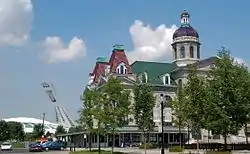 Marché Maisonneuve, a major farmer's market, with the statue La Fermière by Alfred Laliberté in the foreground. | |
 | |
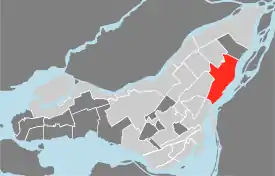 Map of the island of Montreal, with Mercier-Hochelaga-Maisonneuve in red. | |
| Country | Canada |
| Province | Quebec |
| City | Montreal |
| Electoral Districts Federal | Hochelaga La Pointe-de-l'Île Honoré-Mercier |
| Provincial | Hochelaga-Maisonneuve Bourget Anjou–Louis-Riel |
| Government | |
| • Borough Mayor | Pierre Lessard-Blais (PM) |
| • Federal MP(s) | Soraya Martinez Ferrada (LPC) Mario Beaulieu (BQ) Pablo Rodríguez (LPC) |
| • Quebec MNA(s) | Alexandre Leduc (QS) Richard Campeau (CAQ) Lise Thériault (PLQ) |
| Area | |
| • Total | 25.4 km2 (9.8 sq mi) |
| Population | |
| • Total | 136,024 |
| • Density | 5,353.2/km2 (13,865/sq mi) |
| • Dwellings | 66,950 |
| Time zone | UTC-5 (EST) |
| • Summer (DST) | UTC-4 (EDT) |
| Postal code(s) | |
| Area code(s) | (514) and (438) |
| Website | https://montreal.ca/mercier-hochelaga-maisonneuve |
History
See Mercier and Hochelaga-Maisonneuve articles for a more detailed histories of respective areas
Hochelaga was founded as a village in 1870, and annexed to Montreal in 1883. In response, disatisfied landowners founded the village of Maisonneuve to the east.[3]
Maisonneuve grew rapidly and became known as the Pittsburgh of Canada for its heavy industry, before finally being annexed to Montreal in 1918.
These factories hired many workers, including immigrants and people from the surrounding countryside. They worked in the shoe, textile, tanning, slaughterhouse, tobacco, food, and shipbuilding industries.
In 1920, many factories closed and moved east to Mercier. Mercier was an agglomeration of old villages: Beau-Rivage, Longue-Pointe and Tétreaultville. It was previously annexed to Montreal in 1910, before Maisonneuve.
In 1960, the construction of the Autoroute 25 saw the demolition of many residential buildings in Mercier and divided it into two districts: Mercier-Ouest and Mercier-Est.
Starting in the 1980s, Hochelaga-Maisonneuve suffered significant economic and social decline, gaining a bad reputation for poverty, unemployment and organized crime.[4][5][6][7]
In recent years Hochelaga-Maisonneuve, and to a much lesser extent Mercier, has experienced significant change and gentrification.[8][9]
Geography
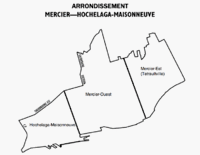
Located in the east end of the Island of Montreal, it was part of the City of Montreal prior to the 2002 municipal mergers. It is composed of the Hochelaga-Maisonneuve, Mercier-Ouest (Longue-Pointe) and Mercier-Est (Tétraultville) areas. Each area has roughly the same population, but they differ in their commercial and social characteristics.
The largely oblong borough is bordered to the west by Ville-Marie (Centre-Sud), northwest by the borough of Rosemont—La Petite-Patrie, on the northeast by Saint Leonard and Anjou, and to the east by Montréal-Est. To the south is the Saint Lawrence River.
Its main arteries running east to west are Rue Notre-Dame, Rue Sainte-Catherine Est, Rue Ontario, Rue Hochelaga, Avenue Pierre De Coubertin and Rue Sherbrooke.
It has an area of 25,4 km² and the evolution of industry and transportation has profoundly transformed the borough.
Demographics[10]
| Year | Pop. | ±% |
|---|---|---|
| 1966 | 185,172 | — |
| 1971 | 179,085 | −3.3% |
| 1976 | 154,921 | −13.5% |
| 1981 | 141,571 | −8.6% |
| 1986 | 137,722 | −2.7% |
| 1991 | 130,589 | −5.2% |
| 1996 | 125,519 | −3.9% |
| 2001 | 128,463 | +2.3% |
| 2006 | 129,110 | +0.5% |
| 2011 | 131,483 | +1.8% |
| 2016 | 136,024 | +3.5% |
| Language | Population | Percentage (%) |
|---|---|---|
| French | 105,885 | 85% |
| English | 6,285 | 5% |
| Other languages | 12,830 | 10% |
| Language | Population | Percentage (%) |
|---|---|---|
| French | 99,650 | 78% |
| English | 4,400 | 4% |
| Other languages | 24,645 | 19% |
| Ethnicity | Population | Percentage (%) |
|---|---|---|
| Not a visible minority | 103,240 | 78.4% |
| Visible minorities | 28,470 | 21.6% |
Employment
The borough is often cast in a negative light, mainly due to its economic planning and high poverty rate. However, it is often neglected to mention that the borough, despite a descriptive accent on its poverty, has large industrial zones and is commercially dynamic. It is often considered 'up and coming' with new revitalization plans for its residential zones.
According to 'Recensement des établissements et de l'emploi à Montréal (REEM 2000)' there's been an increase of 95% in professional and technical jobs in the borough. However, this can be attributed to gentrification in the area, specifically in the Hochelaga district.
The average family income in Mercier-Hochelaga-Maisonneuve is $48,544 and personal income of $29,919 are considerably below the Montreal average. Nearly 19% of the borough's population is considered low-income, and there are patches of poverty scattered throughout the borough and heavily concentrated in the Hochelaga-Maisonneuve district.[11]
Government
Borough council
| District | Position | Name | Party | |
|---|---|---|---|---|
| — | Borough mayor City councillor |
Pierre Lessard-Blais | Projet Montréal | |
| Hochelaga | City councillor | Éric Alan Caldwell | Projet Montréal | |
| Louis-Riel | City councillor | Karine Boivin Roy | Ensemble Montréal | |
| Maisonneuve–Longue-Pointe | City councillor | Laurence Lavigne Lalonde | Projet Montréal | |
| Tétreaultville | City councillor | Suzie Miron | Projet Montréal |
Federal and provincial
The borough is divided among the following federal ridings:
It is divided among the following provincial electoral districts:
Features
The borough is bisected by Autoroute 25 and contains the Montreal entrance to the Louis Hippolyte Lafontaine Tunnel. It is served by the eastern end of the green line of the Montreal metro; the Honoré-Beaugrand and Radisson stations are connected to important bus termini.
Attractions in the area include the Olympic Stadium, Saputo Stadium and Montreal Biodome, the Montreal Botanical Garden, the Château Dufresne, Collège de Maisonneuve, the Marché Maisonneuve, the Théâtre Denise-Pelletier, the Hôpital Maisonneuve-Rosemont, and the Place Versailles shopping centre.
The Canadian Armed Forces also have a base, CFB Montreal, in the east of the borough.
The borough is home to the Church of Nativité-de-la-Sainte-Vierge-d'Hochelaga.
The Montreal Public Libraries Network operates the Hochelaga, Langelier, Maisonneuve, and Mercier libraries.
Education
The borough has one French language cégep, College de Maisonneuve.
The Commission scolaire de Montréal (CSDM) operates French-language public schools.[12]
Elementary
- École Baril
- École Notre-Dame-de-L'Assomption
- École Maisonneuve
- École Saint-Clément
- École Saint-Jean-Baptiste-de-Lasalle
- École Notre-Dame-des-Victoires
- École Saint-Nom-de-Jésus
- École Louis Dupire
- École Saint-Fabien
- École Saint-Donat
- École Boucher-De La Bruère
- École Sainte-Louise-de-Marillac
- École Sainte-Claire
- École Saint-François-d'Assise
- École Saint-Justin
- École La Vérendrye
- École Irénée-Lussier
- École Armand-Lavergne
- École Philippe-Labarre
High School
- École Sécondaire Chomedey-De Maisonneuve
- École Sécondaire Marguerite-De Lajemmerais
- École Secondaire Édouard-Montpetit
- École Secondaire Académie Dunton
- École Sécondaire Louise-Trichet
Specialized
- École des Métiers de la Construction de Montréal
- École des Métiers de l'aérospatiale de Montréal
- École pour Adultes Centre Hochelaga-Maisonneuve
- École Eulalie-Durocher (for intellectually disabled)
- École de la Lancée (for boys with behavioural problems and in foster care)
The English Montreal School Board (EMSB) operates English-language schools.[13]
Elementary
- Edward Murphy Elementary School
High School
(for high school, students must go to nearby Vincent Massey Collegiate in Rosemont)
Gallery
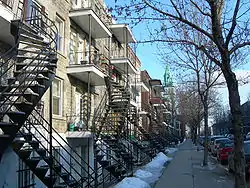 Rowhouses in Hochelaga-Maisonneuve
Rowhouses in Hochelaga-Maisonneuve Sanctuaire Marie-Reine-des-Coeurs
Sanctuaire Marie-Reine-des-Coeurs
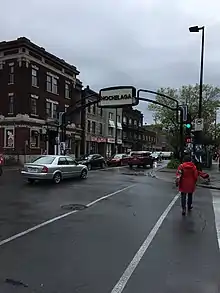
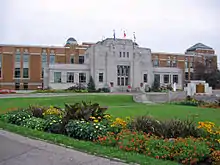
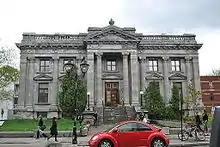 The Maisonneuve library
The Maisonneuve library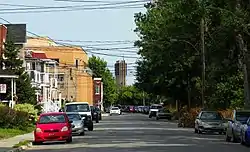 A suburban area of Tétraultville
A suburban area of Tétraultville
See also
| Wikimedia Commons has media related to Mercier–Hochelaga-Maisonneuve. |
- Boroughs of Montreal
- Districts of Montreal
- Municipal reorganization in Quebec
References
- Ministère des Affaires Municipales et Régions: Mercier–Hochelaga-Maisonneuve (Montreal)
- http://ville.montreal.qc.ca/pls/portal/docs/PAGE/MTL_STATS_FR/MEDIA/DOCUMENTS/PROFIL_SOCIOD%C9MO_MERCIER%20HOCHELAGA%20MAISONNEUVE%202016.PDF
- http://www.memorablemontreal.com/accessibleQA/en/histoire.php?quartier=7
- Forget, Dominique (8 May 2013). "Mon quartier me rend malade" (in French). Montreal: L'Actualité. Retrieved 22 November 2020.
- "Une piquerie d'Hochelaga exaspère les voisins" (in French). Montreal: Journal de Montréal. 24 July 2020. Retrieved 26 November 2020.
- "Un décès qui a marqué un tournant dans notre histoire" (in French). Montreal: Journal de Montréal. 9 August 2020. Retrieved 26 November 2020.
- "Quebec biker war's innocent victims: 'I never thought it would happen to my son'". Montreal: Montreal Gazette. 13 July 2019. Retrieved 26 November 2020.
- "Hochelaga-Maisonneuve residents rally against gentrification". Montreal: Global News. 20 May 2018. Retrieved 26 November 2020.
- "État des lieux de la gentrification dans Hochelaga-Maisonneuve" (in French). Montreal: Le Devoir. 5 May 2017. Retrieved 26 November 2020.
- http://ville.montreal.qc.ca/pls/portal/docs/PAGE/MTL_STATS_FR/MEDIA/DOCUMENTS/PROFIL_SOCIOD%C9MO_MERCIER%20HOCHELAGA%20MAISONNEUVE%202016.PDF
- http://ville.montreal.qc.ca/pls/portal/docs/PAGE/MTL_STATS_FR/MEDIA/DOCUMENTS/PROFIL_SOCIOD%C9MO_MERCIER%20HOCHELAGA%20MAISONNEUVE%202016.PDF
- https://www.cssdm.gouv.qc.ca/trouver-une-ecole/
- https://www.emsb.qc.ca/emsb/schools/elementary/school-search
La ville de Montreal, Arrondissement de Mercier-Hochelaga Maisonneuve: Plan strategic de developpement economique 2005-2008 (Plan D'action local pour l'economie et l'emploi) Le Groupe DBSF, Corporation de developpement de l'Est, May 2005